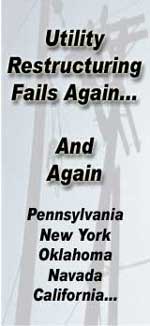
August 2001 IBEW Journal From East to West, Americas fascination with utility deregulation has been exposed as a costly lesson on the consequences of market forces calling the shots without proper government oversight. A new study shows the toll deregulation has taken on Pennsylvania residentshigher cost and less reliability. New York is struggling to cope with a restructuring plan critics are calling a failure. And Oklahoma and Nevada pulled the plug on deregulation last spring. Pennsylvania has been held up by the states deregulation proponents as a shining example of how to do it right, but the state is not reaping any of its promised rewards. A study released in late May describes a familiar scenario: Pennsylvanias utilities are maximizing profits, cutting work forces and providing consumers with a declining level of quality and service. The report, commissioned by a state utility watchdog group that includes the IBEW and other unions, concludes the utilities have reinvested only 5 percent of their profits to upgrade operations since 1994 while $15 million in profits have fled the state. And the states electric utility work force has declined by approximately 7,500 workers. Complaints are up and the average time consumers wait for power to be restored after an outage increased 30 minutes from 1994 to 1999. On behalf of its 11,000 gas and electric utility employees, the IBEW has called upon the Pennsylvania Consumer Affairs Committee to re-impose regulations sufficient to protect consumers. The Consumer Federation of America is warning other states not to take a similar approach to utility restructuring. (States) should take a very careful look at what is and is not happening in Pennsylvania before they leap into the abyss of electricity restructuring, said the CFA. The organization said initial savings from restructuring were the result of rate cuts that the Public Utilities Commission imposed, not from competition in the market. Price caps, a form of price regulation for which the Bush administration has special disdain, continue in place in Pennsylvania, and are one of the primary mechanisms protecting consumers from market-driven price increases. New York, many fear, is the state most likely to join California in rolling blackouts this year. Consumer prices are rising with demand while new power plants remain years from reality. Republican Governor George Pataki, long one of the states chief proponents of utility restructuring, is calling for the states transmission grid operator to control prices charged by wholesale energy providers. This is a complete turnaround by a politician who has vehemently argued against government regulation of the market. Critics say Pataki ignored warnings that the electricity surplus of the mid-1990s would shortly evaporate and did not consider the likelihood of power shortages. He also slashed a once-ambitious statewide conservation budget that could have been saving the state the equivalent output of a medium-sized power plant. Now the state is scrambling to erect emergency generators and hoping to avoid a California-style crisis. In Oklahoma, legislators who had been waffling for years over how to implement deregulation in the electricity industry have finally dumped the idea altogether. The state legislature voted overwhelmingly in May to delay deregulation indefinitely. Governor Frank Keating (R) is expected to sign the bill, which gained momentum as Californias crisis has unfolded. The states power companies have been in limbo for the past several months as lawmakers debated how to proceed with a planned July 2002 market opening. Now an advisory committee composed of members of the executive branch and state legislature will take up crafting new recommendations by the end of next year. Nevada passed emergency legislation in April to halt deregulation of the electricity industry in its tracks in the wake of Californias disaster. Local 1245 won a victory for its members employed by PG&E, the utility giant whose debts under restructuring sent them into bankruptcy. The judge ordered PG&E to uphold its labor agreements, an order Local 1245 had been fighting hard to win. Without such an order, the wages and benefits of Local 1245 members at PG&E could have been vulnerable to attack as creditors jockey for their slice of PG&Es limited revenues. Under the order, PG&E will be authorized to make good on its contractual obligations to employees, including grievance settlements, arbitration awards and severance benefits.
|
 Coming Soon to a Utility Bill Near You: Higher Electric Price$
Coming Soon to a Utility Bill Near You: Higher Electric Price$
|